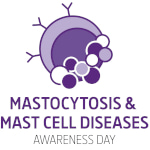International Mastocytosis & Mast Cell Diseases Awareness Day Date in the current year: October 20, 2026
 International Mastocytosis & Mast Cell Diseases Awareness Day is observed annually on October 20. It was created to raise awareness of a group of diseases involving mast cells that can range from relatively benign to debilitating and life-threatening.
International Mastocytosis & Mast Cell Diseases Awareness Day is observed annually on October 20. It was created to raise awareness of a group of diseases involving mast cells that can range from relatively benign to debilitating and life-threatening.Mast cells are immune system cells found in most connective tissues, particularly in areas that interact with the outside environment, such as the skin, airways, and digestive tract. These cells are filled with granules containing inflammatory mediators, such as histamine and heparin. These mediators are released when mast cells detect potential threats, such as allergens, pathogens, or tissue injury. This release helps the body respond quickly to danger by increasing blood flow and attracting other immune cells to the site.
Mast cell diseases develop when mast cells release mediators inappropriately and/or proliferate and accumulate in multiple organ systems, causing a variety of symptoms that can range from itching and fatigue to life-threatening anaphylaxis. The three most common mast cell diseases are mastocytosis, mast cell activation syndrome, and hereditary alpha tryptasemia.
Mastocytosis is caused by the accumulation of defective mast cells that release histamine and other inflammatory mediators. Its symptoms resemble an allergic reaction and may include itching, hives, nausea, vomiting, diarrhea, fatigue, low blood pressure, enlarged liver and spleen, and anaphylaxis.
Mast cell activation syndrome (MCAS) develops when mast cells inappropriately and excessively release mediators, causing dermatologic, cardiovascular, gastrointestinal, neuropsychiatric, and respiratory symptoms. Many of its symptoms are similar to those of mastocytosis; however, unlike mastocytosis, MCAS does not involve the excessive proliferation of mast cells.
Hereditary alpha tryptasemia (HAT) is a genetic condition in which a person has extra copies of the TPSAB1 gene, which is responsible for producing alpha tryptase, an enzyme that is stored and released by mast cells. This results in chronically elevated alpha-tryptase levels in the blood. While some people with HAT do not develop symptoms, others experience chronic symptoms resembling mastocytosis or MCAS, such as itching, hives, low blood pressure, and gastrointestinal issues.
Other mast cell diseases include monoclonal mast cell activation syndrome (MMAS) and neoplastic mast cell disorders, such as mastocytomas (typically benign mast cell tumors), mast cell sarcoma (an aggressive form of sarcoma), and mast cell leukemia (an aggressive form of acute myeloid leukemia). Most mast cell disorders are rare and difficult to diagnose because their symptoms are non-specific, except for mastocytomas.
International Mastocytosis & Mast Cell Diseases Awareness Day was created in 2018 by 24 mast cell advocacy groups from Argentina, Australasia, Belgium, Brazil, Canada, Croatia, the Czech Republic, Denmark, France, Germany, Greece, Hungary, Italy, Mexico, the Netherlands, New Zealand, Norway, Poland, Portugal, Romania, Slovenia, Spain, Switzerland, the United Kingdom, and the United States. The day aims to raise awareness of mast cell diseases and advocate for better diagnostics, access to treatment, and further research.
- Category
- International Observances
- Tags
- International Mastocytosis & Mast Cell Diseases Awareness Day, international observances, awareness days, rare diseases, mast cells